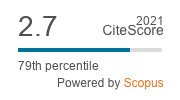Fractional Curl With Standard Fractional Vector Cross Product For A Vector Pair
Fractional Curl With Standard Fractional Vector Cross Product For A Vector Pair
Keywords:
Vector cross product, Fractional vector cross product, Fractional CurlAbstract
In this research fractional curl of an electromagnetic vector field is presented using the new definition of Standard Fractional Vector Cross Product. The properties are further supported with particular case at $\gamma =1$ which satisfies the standard vector cross product. The new definition is also defined for $\gamma = 0, \gamma = 0\leq \gamma \leq 1, \gamma = 1$. These mentioned concepts makes it geometrically real and visually more presentable. This new definition can be applied in various fields of electromagnetic theory, electrodynamics, elastodynamics, fluid flow etc.
References
M. J. Crowe, textit{ A history of vector analysis, The evolution of the idea of a vectorial system, }University of Notre Dame Press, Notre Dame, Ind.-London, 1967.
S. Das, textit{ Geometrically deriving fractional cross product and fractional curl}, Int. J. Math. Comput. textbf20(2013), no. 3, 1-29.
R. A. Horn, C. R. Johnson, textit{Matrix Analysis}, Cambridge Univ. Press UK, 1985.
M. M. Kankarej, J. P. Singh, textit{ Standard Fractional Vector Cross Product}, (2023), under review.
S. Mishra, R. K. Mishra, and S. Patnaik, textit{Fractional Cross product applied in radiation characteristic in micro-strip antenna: A simulation approach}Test Engineering and Management, textbf8(2019), 1392-1401
M. M. Tripathi and J. R. Kim, textit{Fractional vector cross product}, J. Kor. Soc. Math. educ. Ser B: Pure Appl. Math, textbf{29}(2022), No. 1, pp 103-112.
Downloads
Published
How to Cite
Issue
Section
License
Copyright (c) 2023 Results in Nonlinear Analysis

This work is licensed under a Creative Commons Attribution 4.0 International License.



